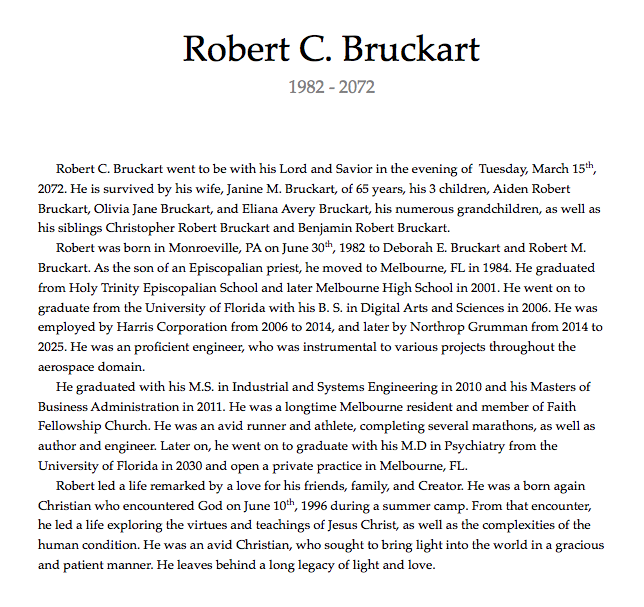Several days ago, I encountered a post by Chantel Soumis on LinkedIn where she discussed the lessons she learned from writing her obituary. I know this sounds strange, but several months ago my wife and I (finally) completed our wills with the assistance of a local lawyer. We’ve been putting that task off for months (if not years), but then I read about the tragic helicopter crash that claimed the life of Kobe Bryant. I later learned (and I don’t know if this is true), that the life insurance policy precluded both Kobe and his wife riding in a helicopter together. I was stunned when I heard that, realizing that someone had the wisdom to consider the inherent risk of helicopters.
Writing my obituary was not easy. I quickly rushed to list my accolades and accomplishments, and was confronted with the simple question, “Does this matter?” And while I’m certainly not subscribing to nihilism and anarchy, I kept going back to the question of whether someone else would simply care about the number of degrees I attained or the accomplishments of my profession. Sadly, I don’t think so. For example, I love my parents. I’m unquestionably proud of them. But will I forget their educational accomplishments? I might. All of this starts scratching a bigger question – what do you want to be remembered for?
I’m not one to have a lot of requests for last wishes. If anything, I would prefer for my family to peacefully resolve all remaining assets (as opposed to divisive politicking that I often see surrounding families that leave large, unclaimed inheritances). While I’m generally don’t have strong opinions concerning funeral arrangements, I also understand that we, as humans, need closure. And in that sense, the funeral is sometimes for the families as much as the deceased. But all of this goes back to the obituary. Out of all my writings and works, imagine for a moment that the most read work will be my obituary. What do you want to leave people with?
I started with the local paper. Oftentimes I see phrases like, “passed on” or “went to be with his Lord and Savior”, or more simply, “died”. There is a part of me that wants (and needs) to communicate my faith and relationship with Jesus. In other words, my first iteration of my obituary stated quite plainly that was a born again Christian. But then does that matter? Am I turning my obituary into a sermon? I’ve met plenty of Christians who were not “born again”, but still maintained deep and moving faiths.
Vulnerability
In marital counseling, vulnerability fosters intimacy. And similar to Chantel’s 4th lesson, writing my obituary made me realize that I am simply afraid of death. I could also say I’m afraid of life (if that makes any sense), but the fact of the matter is that I don’t want to die. There is no question I’m a creature of comfort, and if I found a magical elixir that caused immortality, I’d probably take it.
In Tuck Everlasting, Angus Tuck is famously recognized for disliking immortality and dreaming of dying and going to heaven. While I can certainly appreciate that sentiment, death is unknown, and the unknown can be scary. Secondly, my obituary brought up the question of what age I think I’d live to see. I drafted an optimistic 90 years old, but honestly 2020 has been a historic year, and I’ve lost more friends than I could have ever imagined.
What if I die at 60? What if I die at 40? All of this brought a sense of urgency of what I’m living for. As someone once said, “Get busy living, or get busy dying.” This recognition of time and aging brought me to the second revelation.
Purpose
The obituaries in my local paper are also heavy on the deceased’s lifelong accomplishments such as a noteworthy career in the military or a specific domain. Some people were famous doctors, others were famous engineers. Some were housewives. But is one professional better than another? Again, does my profession and professional accomplishments matter? And more importantly, am I working in a domain and field that I am proud of? Do I want to be remembered as a software engineer and manager? While I love my profession, I don’t really feel like it’s all I want to be remember by. This brings me to my last point.
Relationships
When I read through my obituary, there is only 1 aspect of it that I feel is important, and that is my relationships. I am proud of my marriage, my wife, and my children. And I think that my legacy is unquestionably the relationships in my life. I’ve been fortunate to live among my endearing friends and family, to be born of such dedicated and loving parents, and to be the father of obedient and outstanding children.
I often joke with my wife that I want engraved on my tombstone, “I wish I spent more time in the office.”, but in all seriousness, writing my obituary helped me realize what contributes to my lasting legacy.
###
Every time I re-read my obituary, I remove something and make it more concise. It generally follows 4 sections. The first outlines relationships and important dates. The second and third outline educational and professional accomplishments. And the last section reveals my faith. Given how crazy 2020 has been so far this year, I certainly recommend writing your obituary (or trying), as well as completing a living will. Your family will thank you 🙂
